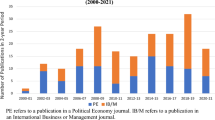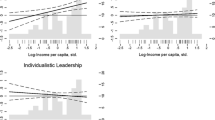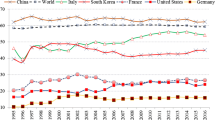Abstract
Empirical research about corruption is quite a new undertaking. In an attempt to determine the causes and consequences of corruption academics have lately concentrated on cross-country analysis. At the center is mostly the use of some professional assessment of the degree of corruption in various countries. Such assessments are sometimes conducted by agencies in an attempt to determine country risks and sold to investors. Other sources such as surveys have been conducted in recent years and contributed to a cross-country assessment of the extent of corruption. These data have been fruitfully applied to the investigations about the following relationships.
Access this chapter
Tax calculation will be finalised at checkout
Purchases are for personal use only
Preview
Unable to display preview. Download preview PDF.
Similar content being viewed by others
References
Ades, A. and R. Di Telia. (1995). “Competition and Corruption.” Draft Paper, Keble College, Oxford University.
— (1996). “The Causes and Consequences of Corruption: A Review of Recent Empirical Contributions.” In: B. Harris-White and G. White (eds.), Liberalization and the New Corruption, Institute of Development Studies Bulletin, 27(2): 6–11.
— (1997). “National Champions and Corruption: Some Unpleasant Interventionist Arithmetic.” The Economic Journal 107: 1023–1042.
Beck, P.J., M.W. Mäher and A.E. Tschoegl. (1991). “The Impact of the Foreign Corrupt Practices Act on US Exports.” Managerial and Decision Economics 12: 295–303.
Bayley, D.H. (1970). “The Effects of Corruption in a Developing Nation.” In A.J. Heidenheimer (ed.), Political Corruption: Readings in Comparative Analysis, New York: Holt Reinehart.
Brunetti, A. G. Kisunko, and B. Weder. (1997). “Credibility of Rules and Economic Growth: Evidence from a World Wide Private Sector Survey.” Background paper for the World Development Report 1997, Washington: The World Bank.
Evans, P.B. and J.E. Rauch. (1996). “Bureaucratic Structures and Economic Performance in Less Developed Countries.” Mimoegraph, San Diego: University of California, San Diego.
Galtung, F. (1997). “The Social and Economic Implications of Corruption.” In: Transparency International (TI) Report 1997, Berlin, pp. 76–78.
Greenacre, M. (1993). Correspondence Analysis in Practice. London: Academic Press.
Heidenheimer, A. J. (1996). “The Topography of Corruption: Explorations in a Comparative Perspective.” International Social Science Journal, 158(3): 337–347.
Hines, J.R. (1995). “Forbidden Payment: Foreign Bribery and American Business after 1977.” Washington D.C.: National Bureau of Economic Research Working Paper, no. 5266.
Kaufmann, D. (1997). “Economic Corruption: Some Facts.” Paper presented at the 8th International Anti-Corruption Conference in Lima, Perú, September.
Knack, St. and P. Keefer (1995) “Institutions and Economic Performance: Cross-Country Tests Using Alternative Institutional Measures.” Economics and Politics 7(3): 207–227.
Lambsdorff, J. Graf. (1995). “The TI Corruption Perception Index, 1995.” Transparency International (TI) Report, Berlin, pp. 51–54.
— (1996). “The TI Corruption Perception Index, 1996.” Transparency International (TI) Report, Berlin, pp. 61–66.
— (1997). “The TI Corruption Perception Index, 1997.” Transparency International (TI) Report, Berlin.
— (1998). “An Empirical Investigation of Bribery in International Trade.” European Journal of Development Research, 11(1): 40–59.
Lancaster T. and G. Montinola. (1997). “Toward a Methodology for the Comparative Study of Political Corruption.” Forthcoming in Crime, Law and Social Change, special issue on “Corruption and Reform.”
Mauro, Paolo. (1995). “Corruption and Growth,” Quarterly Journal of Economics, 110(3): 681–712.
— (1997). “The Effects of Corruption on Growth, Investment, and Government Expenditure: A Cross-Country Analysis.” In Kimberly Ann Elliot (ed.), Corruption and the Global Economy, Washington D.C.: Institute for International Economics, pp. 83–107.
Tanzi, V. and Davoodi, H. (1997). “Corruption, Public Investment, and Growth.” IMF Working Paper WP/97/139.
Van Rijckeghem, C., and Beatrice Weder. (1997). “Corruption and the Role of Temptation: Do Low Wages in Civil Service Cause Corruption?” IMF Working Paper, WP/97/73.
Wedeman, A. (1996). “Looters, Rent-scrapers, and Dividend-collectors: The Political Economy of Corruption in Zaire, South Korea, and the Philippines.” Paper presented at the 1996 annual meeting of the American Political Science Associations, San Francisco.
Wei, S. J. (1997). “How Taxing is Corruption on International Investors.” Washington D.C.: NBER Working Paper 6030.
Wheeler, D. and A. Mody. (1992). “International Investment Location Decisions: The Case of U.S. Firms.” Journal of International Economics, 33: 57–76.
Author information
Authors and Affiliations
Editor information
Editors and Affiliations
Rights and permissions
Copyright information
© 1998 Springer Science+Business Media New York
About this chapter
Cite this chapter
Lambsdorff, J.G. (1998). Corruption in Comparative Perception. In: Jain, A.K. (eds) Economics of Corruption. Recent Economic Thought Series, vol 65. Springer, Boston, MA. https://doi.org/10.1007/978-1-4615-4935-2_5
Download citation
DOI: https://doi.org/10.1007/978-1-4615-4935-2_5
Publisher Name: Springer, Boston, MA
Print ISBN: 978-1-4613-7239-4
Online ISBN: 978-1-4615-4935-2
eBook Packages: Springer Book Archive




